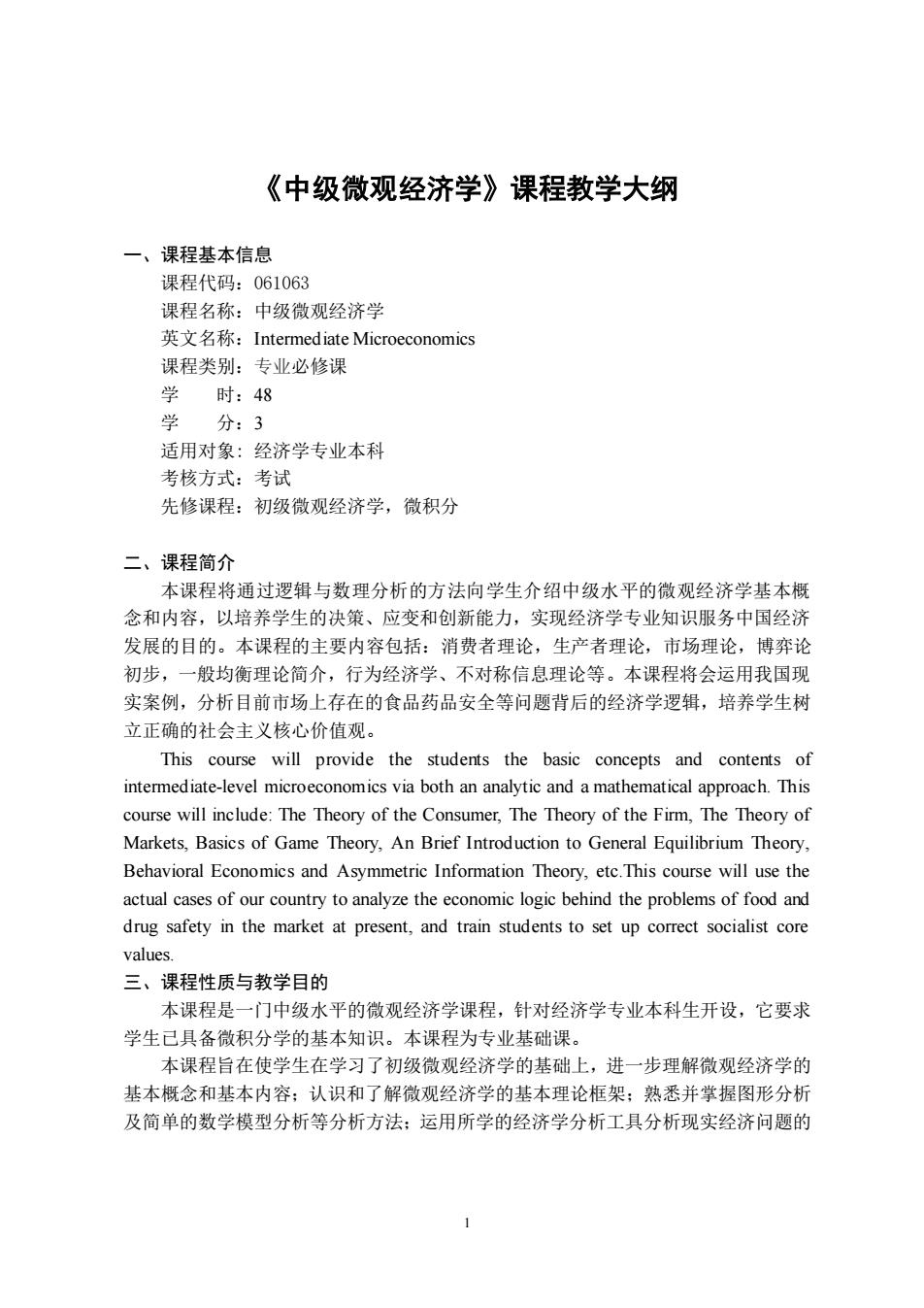
《中级微观经济学》课程教学大纲 一、课程基本信息 课程代码:061063 课程名称:中级微观经济学 英文名称:Intermediate Microeconomics 课程类别:专业必修课 时:48 学 分:3 适用对象:经济学专业本科 考核方式:考试 先修课程:初级微观经济学,微积分 二、课程简介 本课程将通过逻辑与数理分析的方法向学生介绍中级水平的微观经济学基本概 念和内容,以培养学生的决策、应变和创新能力,实现经济学专业知识服务中国经济 发展的目的。本课程的主要内容包括:消费者理论,生产者理论,市场理论,博弈论 初步,一般均衡理论简介,行为经济学、不对称信息理论等。本课程将会运用我国现 实案例,分析目前市场上存在的食品药品安全等问题背后的经济学逻辑,培养学生树 立正确的社会主义核心价值观。 This course will provide the students the basic concepts and contents of intermediate-level microeconomics via both an analytic and a mathematical approach.This course will include:The Theory of the Consumer,The Theory of the Firm,The Theory of Markets,Basics of Game Theory,An Brief Introduction to General Equilibrium Theory. Behavioral Economics and Asymmetric Information Theory,etc.This course will use the actual cases of our country to analyze the economic logic behind the problems of food and drug safety in the market at present,and train students to set up correct socialist core values 三、课程性质与教学目的 本课程是一门中级水平的微观经济学课程,针对经济学专业本科生开设,它要求 学生已具备微积分学的基本知识。本课程为专业基础课。 本课程旨在使学生在学习了初级微观经济学的基础上,进一步理解微观经济学的 基本概念和基本内容:认识和了解微观经济学的基本理论框架:熟悉并掌握图形分析 及简单的数学模型分析等分析方法:运用所学的经济学分析工具分析现实经济问题的
1 《中级微观经济学》课程教学大纲 一、课程基本信息 课程代码:061063 课程名称:中级微观经济学 英文名称:Intermediate Microeconomics 课程类别:专业必修课 学 时:48 学 分:3 适用对象: 经济学专业本科 考核方式:考试 先修课程:初级微观经济学,微积分 二、课程简介 本课程将通过逻辑与数理分析的方法向学生介绍中级水平的微观经济学基本概 念和内容,以培养学生的决策、应变和创新能力,实现经济学专业知识服务中国经济 发展的目的。本课程的主要内容包括:消费者理论,生产者理论,市场理论,博弈论 初步,一般均衡理论简介,行为经济学、不对称信息理论等。本课程将会运用我国现 实案例,分析目前市场上存在的食品药品安全等问题背后的经济学逻辑,培养学生树 立正确的社会主义核心价值观。 This course will provide the students the basic concepts and contents of intermediate-level microeconomics via both an analytic and a mathematical approach. This course will include: The Theory of the Consumer, The Theory of the Firm, The Theory of Markets, Basics of Game Theory, An Brief Introduction to General Equilibrium Theory, Behavioral Economics and Asymmetric Information Theory, etc.This course will use the actual cases of our country to analyze the economic logic behind the problems of food and drug safety in the market at present, and train students to set up correct socialist core values. 三、课程性质与教学目的 本课程是一门中级水平的微观经济学课程,针对经济学专业本科生开设,它要求 学生已具备微积分学的基本知识。本课程为专业基础课。 本课程旨在使学生在学习了初级微观经济学的基础上,进一步理解微观经济学的 基本概念和基本内容;认识和了解微观经济学的基本理论框架;熟悉并掌握图形分析 及简单的数学模型分析等分析方法;运用所学的经济学分析工具分析现实经济问题的
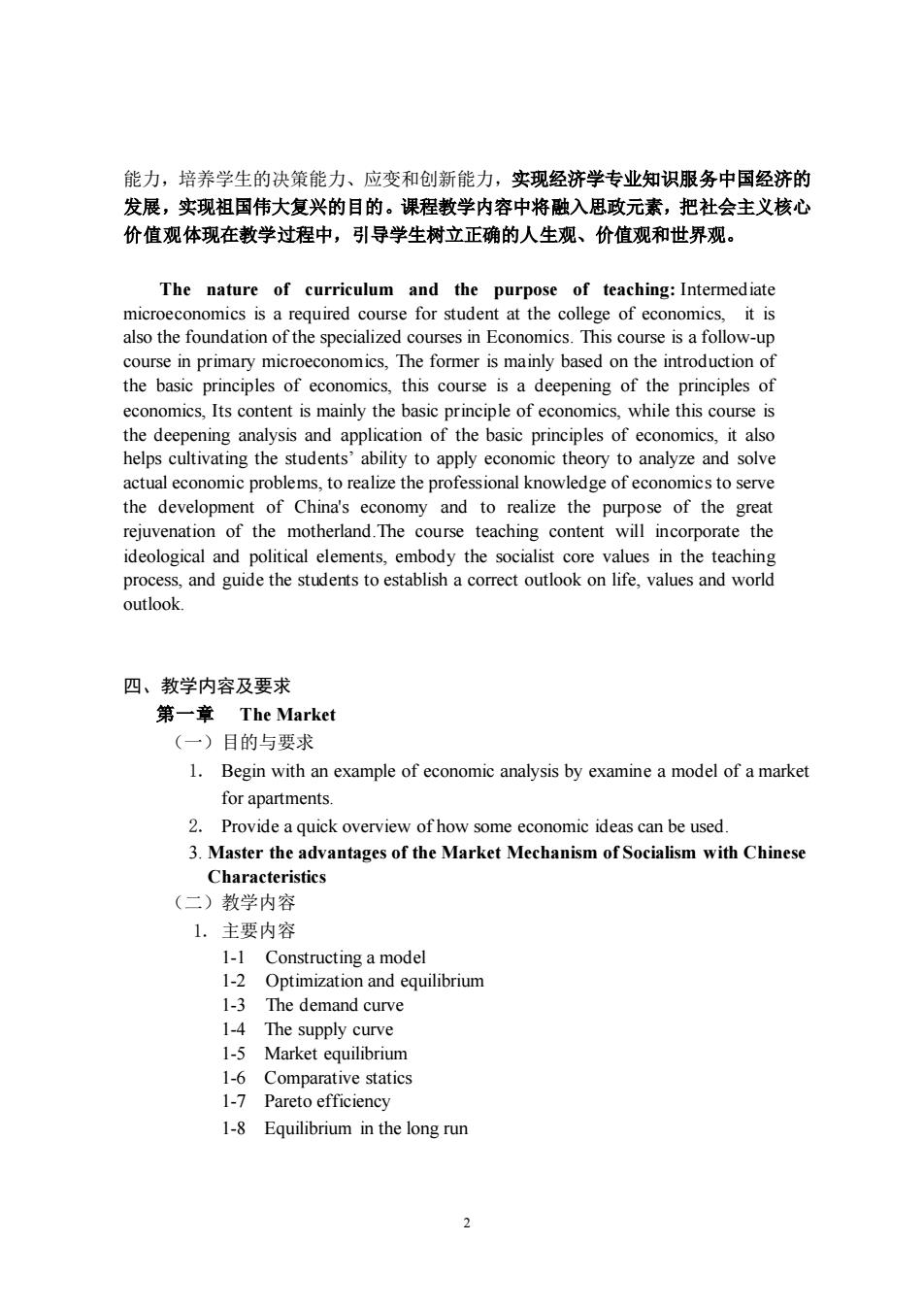
能力,培养学生的决策能力、应变和创新能力,实现经济学专业知识服务中国经济的 发展,实现祖国伟大复兴的目的。课程教学内容中将融入思政元素,把杜会主义核心 价值观体现在教学过程中,引导学生树立正确的人生观、价值观和世界观。 The nature of curriculum and the purpose of teaching:Intermediate microeconomics is a required course for student at the college of economics.it is also the foundation of the specialized courses in Economics.This course is a follow-up conom .The former s mainly base on the intro depening of the principes of economics,Its content is mainly the basic principle of economics,while this course is the deepening analysis and application of the basic principles of economics,it also helps cultivating the students'ability to apply economic theory to analyze and solve nics to serve the development of China's economy and to realize the purpose of the great rejuvenation of the motherland.The course teaching content will incorporate the ideological and political elements,embody the socialist core values in the teaching process,and guide the students to establish a correct outlook on life.values and world outlook 四、教学内容及要求 第一章The Market (一)目的与要求 1.Begin with an example of economic analysis by examine a model of a market for apartments. 2.Provide a quick overview ofhow some economic ideas can be used 3.Master the advantages of the Market Mechanism of Socialism with Chinese Characteristics (一)教学内容 1.主要内容 1-1 Constructing a model 1-2 Optimization and equilibrium 1.3 The demand curve The supply curve 1-5 Market equilibrium 1-6 Comparative statics 1-7 Pareto efficiency 1-8 Equilibrium in the long run 2
2 能力,培养学生的决策能力、应变和创新能力,实现经济学专业知识服务中国经济的 发展,实现祖国伟大复兴的目的。课程教学内容中将融入思政元素,把社会主义核心 价值观体现在教学过程中,引导学生树立正确的人生观、价值观和世界观。 The nature of curriculum and the purpose of teaching: Intermediate microeconomics is a required course for student at the college of economics, it is also the foundation of the specialized courses in Economics. This course is a follow-up course in primary microeconomics, The former is mainly based on the introduction of the basic principles of economics, this course is a deepening of the principles of economics, Its content is mainly the basic principle of economics, while this course is the deepening analysis and application of the basic principles of economics, it also helps cultivating the students’ ability to apply economic theory to analyze and solve actual economic problems, to realize the professional knowledge of economics to serve the development of China's economy and to realize the purpose of the great rejuvenation of the motherland.The course teaching content will incorporate the ideological and political elements, embody the socialist core values in the teaching process, and guide the students to establish a correct outlook on life, values and world outlook. 四、教学内容及要求 第一章 The Market (一)目的与要求 1. Begin with an example of economic analysis by examine a model of a market for apartments. 2. Provide a quick overview of how some economic ideas can be used. 3. Master the advantages of the Market Mechanism of Socialism with Chinese Characteristics (二)教学内容 1. 主要内容 1-1 Constructing a model 1-2 Optimization and equilibrium 1-3 The demand curve 1-4 The supply curve 1-5 Market equilibrium 1-6 Comparative statics 1-7 Pareto efficiency 1-8 Equilibrium in the long run
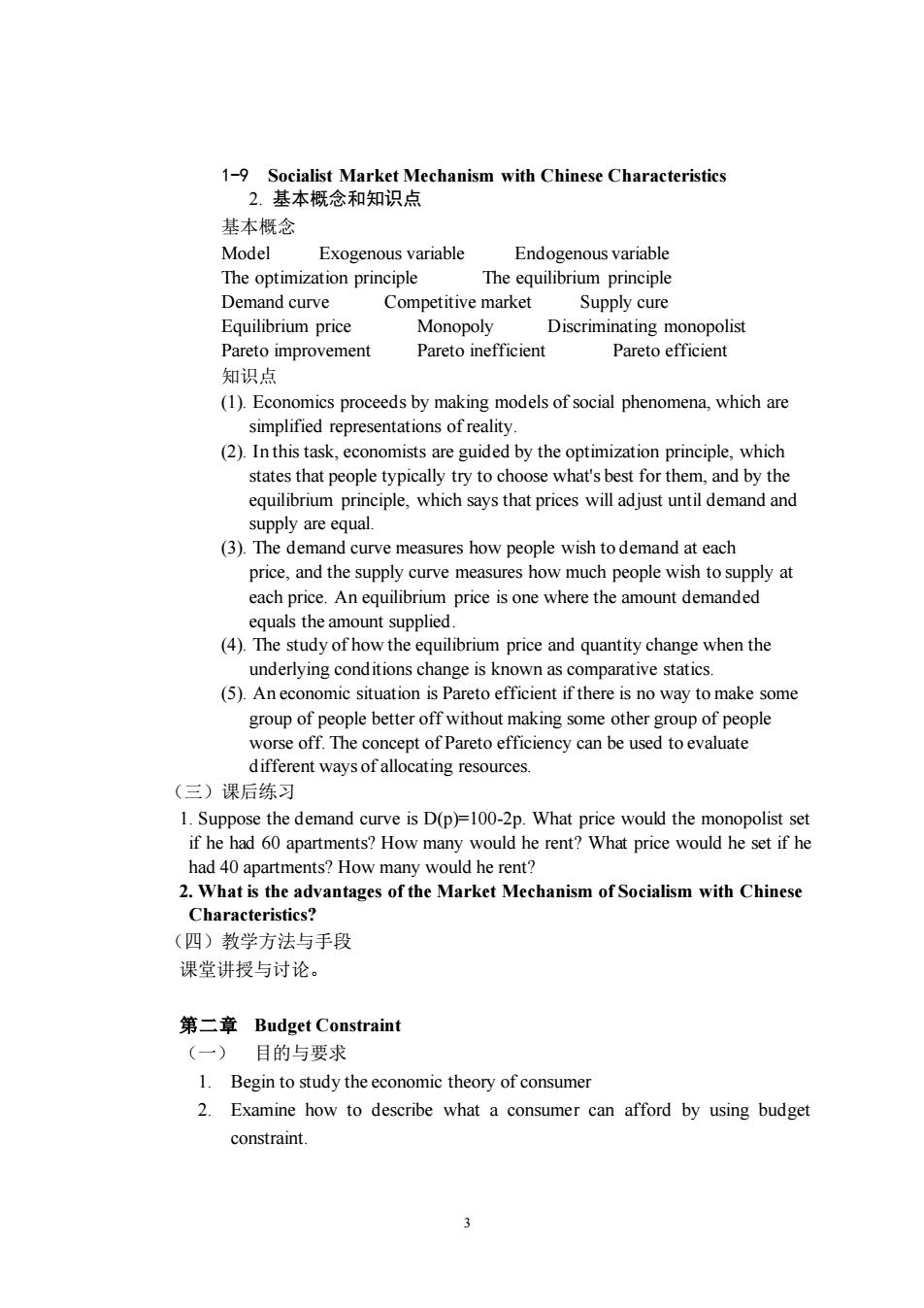
1-9 Socialist Market Mechanism with Chinese Characteristics 2.基本概念和知识点 基本概念 Model Exogenous variable Endogenous variable The optimization principle The equilibrium principle Demand curve Competitive market Supply cure Equlibrium price Monopoly Discrimi Pareto improvemen Pareto inefficient Pareto efficien 知识点 (1).Economics proceeds by making models of social phenomena,which are implified representations of reality (2).In this task,economists are guided by the optimization principle,which states that people typically try to choose what's best for them,and by the equilibrium principle,which says that prices will adjust until demand and supply are equal. (3).The dem and curve r measures ho w people wish to demand at each price,and the supply curve measures how much people wish to supply at each price.An equilibrium price is one where the amount demanded equals the amount supplied (4).The study of how the equilibrium price and quantity change when the underlying conditions change is known as comparative statics. (5).Anecon omic situation is if there isno way to make some group of people better off without making some other group of people worse off.The concept of Pareto efficiency can be used to evaluate different ways of allocating resources. (三)课后练习 1.Suppose the demand curve is D(p)=100-2p.What price would the monopolist set if he had 60 apartments?How many would he rent?What price would he set if he had 40 apartments?How many would he rent? 2.What is the advantages of the Market Mechanism of Socialism with Chinese Cha acteristics? (四)教学方法与手段 课堂讲授与讨论。 第二章Budget Constraint (一)目的与要求 1.Begin to study the economic theory of consumer 2.Examine how to describe what a consumer can afford by using budget constraint 3
3 1-9 Socialist Market Mechanism with Chinese Characteristics 2. 基本概念和知识点 基本概念 Model Exogenous variable Endogenous variable The optimization principle The equilibrium principle Demand curve Competitive market Supply cure Equilibrium price Monopoly Discriminating monopolist Pareto improvement Pareto inefficient Pareto efficient 知识点 (1). Economics proceeds by making models of social phenomena, which are simplified representations of reality. (2). In this task, economists are guided by the optimization principle, which states that people typically try to choose what's best for them, and by the equilibrium principle, which says that prices will adjust until demand and supply are equal. (3). The demand curve measures how people wish to demand at each price, and the supply curve measures how much people wish to supply at each price. An equilibrium price is one where the amount demanded equals the amount supplied. (4). The study of how the equilibrium price and quantity change when the underlying conditions change is known as comparative statics. (5). An economic situation is Pareto efficient if there is no way to make some group of people better off without making some other group of people worse off. The concept of Pareto efficiency can be used to evaluate different ways of allocating resources. (三)课后练习 1. Suppose the demand curve is D(p)=100-2p. What price would the monopolist set if he had 60 apartments? How many would he rent? What price would he set if he had 40 apartments? How many would he rent? 2. What is the advantages of the Market Mechanism of Socialism with Chinese Characteristics? (四)教学方法与手段 课堂讲授与讨论。 第二章 Budget Constraint (一) 目的与要求 1. Begin to study the economic theory of consumer 2. Examine how to describe what a consumer can afford by using budget constraint

(一)教学内容 1.主要内容 2-1 The Budget constraint 2-2 Two goods are oftenenough 2-3 Properties of the budget set 24 How the budget line change The numeraire 2-6 Taxes,subsidies,and rationing 2-7 Budget line changes 2.基本概念和知识点 基本概念 Bud get set Composite good Budget line Opportunity cost Quantity tax Value tax Quantity subsidy 知识点 (1).The budget set consists of all bundles of goods that the consumer can afford at given prices and income.We will typically assume that there ds,but this ass ).me budget linesritemItsoe o wo goo is mor general than it se I-pl/p2 a vertical intercept of m/p2,and a horizontal intercept of m/pl. (3).Increasing income shifts the budget line outward.Increasing the price of good 1 makes the budget line steeper.Increasing the price of good 2 makes the budget line flatter. (4).Taxes,subsidies,and rationing change the slope and position of the budget line changing the prices paid by the consumer. (三) 课后练习 1.Suppose that a budget equation is given by pl*xl+p2*x2 m.The government decides to impose a lump-sum tax of u,a quantity tax on good 1 of t,and a quantity subsidy on good 2 of s.What is formula for the new budget line? (四) 教学方法与手段 课堂讲授与讨论。 第三章Preferences (一) 目的与要求 1.Clarify the economic concept of best things 2. Introduce the concept of preference and indifference curve 3. Present some examples of preferences Introduce the concept of MRS and study how to calculate it 5.Master the relationship between Preference and Socialist Core Values 4
4 (二) 教学内容 1. 主要内容 2-1 The Budget constraint 2-2 Two goods are often enough 2-3 Properties of the budget set 2-4 How the budget line changes 2-5 The numeraire 2-6 Taxes, subsidies, and rationing 2-7 Budget line changes 2. 基本概念和知识点 基本概念 Budget set Composite good Budget line Opportunity cost Quantity tax Value tax Quantity subsidy 知识点 (1). The budget set consists of all bundles of goods that the consumer can afford at given prices and income. We will typically assume that there are only two goods, but this assumption is more general than it seems. (2). The budget line is written as p1x1+p2x2=m. It has a slope of - p1/p2, a vertical intercept of m/p2, and a horizontal intercept of m/p1. (3). Increasing income shifts the budget line outward. Increasing the price of good 1 makes the budget line steeper. Increasing the price of good 2 makes the budget line flatter. (4). Taxes, subsidies, and rationing change the slope and position of the budget line changing the prices paid by the consumer. (三) 课后练习 1. Suppose that a budget equation is given by p1*x1+p2*x2 = m. The government decides to impose a lump-sum tax of u, a quantity tax on good 1 of t, and a quantity subsidy on good 2 of s. What is formula for the new budget line ? (四) 教学方法与手段 课堂讲授与讨论。 第三章 Preferences (一) 目的与要求 1. Clarify the economic concept of best things 2. Introduce the concept of preference and indifference curve 3. Present some examples of preferences 4. Introduce the concept of MRS and study how to calculate it 5. Master the relationship between Preference and Socialist Core Values

(二)教学内容 1.主要内容 3-1 Consumer preferences 3-2 Assumptions about preferences 3-3 Indifference curves 34 ample of preferences Well-behaved preferences 3-6 The marginal rate of substitution 3-7 Other interpretations of the MRS 3-8 Behavior of the mrs 3.9 Relationshin he en Preference and Socialist Core Values 2.基本概念和知识点 基本概念 Strictly preferred Strictly prefers Indifferent Weakly prefers Complete Reflexive Transitive Ind ifference curves Perfect substitute Perfect compliments Neutral good Satiation Discrete good Well-he ed indiffe ce curves Marginal rate of substitution(MRS) Marginal willingness to pay Diminishing marginal rate of substitution 知识点 (1).Economists assume that a consumer can rank various consumption possibilities.The way in which the consumer ranks the consumption undles describes the onsumers prefere (2).Indifference curvescan be used to depict different kindsof preferences. (3).Well-behaved preferences are monotonic(meaning more is better)and convex(meaning averages are preferred to extremes). (4).The marginal rate of substitution(MRS)measures the slope of the indifference curve.This can be interpreted as how much the consumer is willing to give up of good 2 to acquire more of good 1. 课后练习 1.If both pepperoni and anchovies are bads,will the indifference curve have a positive or negative slope? 2.If good I is a"neutral",what is its marginal rate or substitution for good 2? (四)教学方法与手段 课堂讲授与讨论
5 (二) 教学内容 1. 主要内容 3-1 Consumer preferences 3-2 Assumptions about preferences 3-3 Indifference curves 3-4 Example of preferences 3-5 Well-behaved preferences 3-6 The marginal rate of substitution 3-7 Other interpretations of the MRS 3-8 Behavior of the MRS 3-9 Relationship between Preference and Socialist Core Values 2. 基本概念和知识点 基本概念 Strictly preferred Strictly prefers Indifferent Weakly prefers Complete Reflexive Transitive Indifference curves Perfect substitute Perfect compliments Neutral good Satiation Discrete good Well-behaved indifference curves Monotonicity Marginal rate of substitution (MRS) Marginal willingness to pay Diminishing marginal rate of substitution 知识点 (1). Economists assume that a consumer can rank various consumption possibilities. The way in which the consumer ranks the consumption bundles describes the consumer's preferences. (2). Indifference curves can be used to depict different kinds of preferences. (3). Well-behaved preferences are monotonic (meaning more is better) and convex (meaning averages are preferred to extremes). (4). The marginal rate of substitution (MRS) measures the slope of the indifference curve. This can be interpreted as how much the consumer is willing to give up of good 2 to acquire more of good 1. (三) 课后练习 1. If both pepperoni and anchovies are bads, will the indifference curve have a positive or negative slope? 2. If good 1 is a “neutral”, what is its marginal rate or substitution for good 2? (四) 教学方法与手段 课堂讲授与讨论
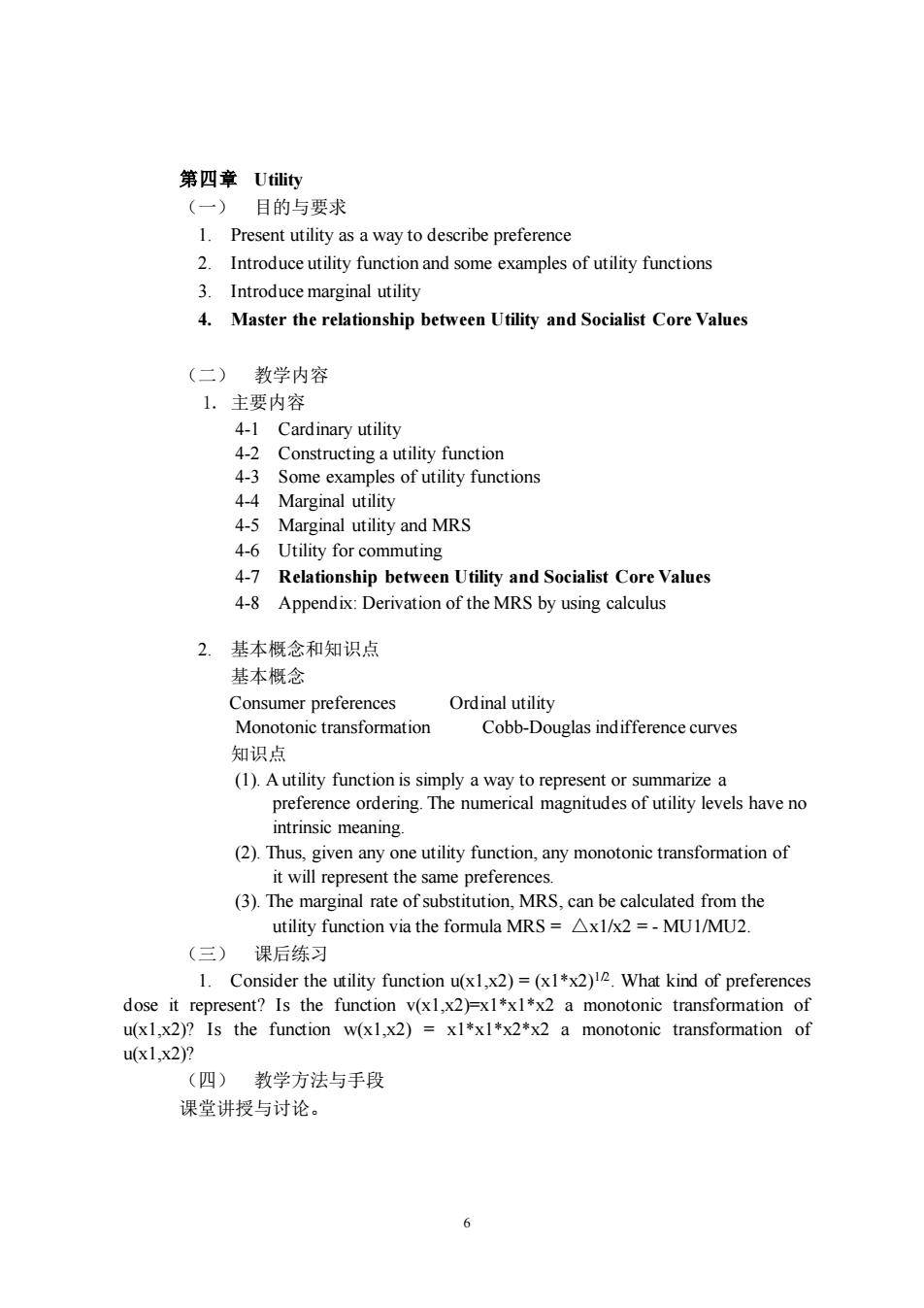
第四章Utility (一) 目的与要求 1.Present utility as a way to describe preference 2 Introduce utility function and some examples of utility functions 3.Introduce marginal utility 4.Master the relationship between Utility and Socialist Core Values (二)教学内容 1.主要内容 41 Cardinary utility 4 Constructing a utility function 43 Some examples of utility functions 4-4 Marginal utility 4-5 Marginal utility and MRS 4-6 Utility for commuting 4-7 Relationship between Utility and Socialist Core Values 4-8 Appendix:Derivation of the MRS by using calculus 2.基本概念和知识点 基本概念 Consumer preferences Ordinal utility onic transformation Cobb-Douglas indifference curves 知识点 (1).Autility function is simply a way to represent or summarize a preference ordering.The num ical itudes of utility levels have no ic meaning. (2).Thus,given any one utility function,any monotonic transformation of it will represent the same preferences. (3).The marginal rate of substitution,MRS,can be calculated from the atility function via the formula MRS=Ax1/x2=-MU1/MU2. (三)课后练习 1.Consider the utility function u(x1.x2)=(x1x).What kind of preferences dose it r epres nt?Is the fund v(x1.x2 x2 a monoton c trans ormation of u(x1,x2)?Is the function w(x1,x2)=x1*x1*x2*x2 a monotonic transformation of u(1,x2) (四)教学方法与手段 课堂讲授与讨论。 6
6 第四章 Utility (一) 目的与要求 1. Present utility as a way to describe preference 2. Introduce utility function and some examples of utility functions 3. Introduce marginal utility 4. Master the relationship between Utility and Socialist Core Values (二) 教学内容 1. 主要内容 4-1 Cardinary utility 4-2 Constructing a utility function 4-3 Some examples of utility functions 4-4 Marginal utility 4-5 Marginal utility and MRS 4-6 Utility for commuting 4-7 Relationship between Utility and Socialist Core Values 4-8 Appendix: Derivation of the MRS by using calculus 2. 基本概念和知识点 基本概念 Consumer preferences Ordinal utility Monotonic transformation Cobb-Douglas indifference curves 知识点 (1). A utility function is simply a way to represent or summarize a preference ordering. The numerical magnitudes of utility levels have no intrinsic meaning. (2). Thus, given any one utility function, any monotonic transformation of it will represent the same preferences. (3). The marginal rate of substitution, MRS, can be calculated from the utility function via the formula MRS = △x1/x2 = - MU1/MU2. (三) 课后练习 1. Consider the utility function u(x1,x2) = (x1*x2)1/2. What kind of preferences dose it represent? Is the function v(x1,x2)=x1*x1*x2 a monotonic transformation of u(x1,x2)? Is the function w(x1,x2) = x1*x1*x2*x2 a monotonic transformation of u(x1,x2)? (四) 教学方法与手段 课堂讲授与讨论
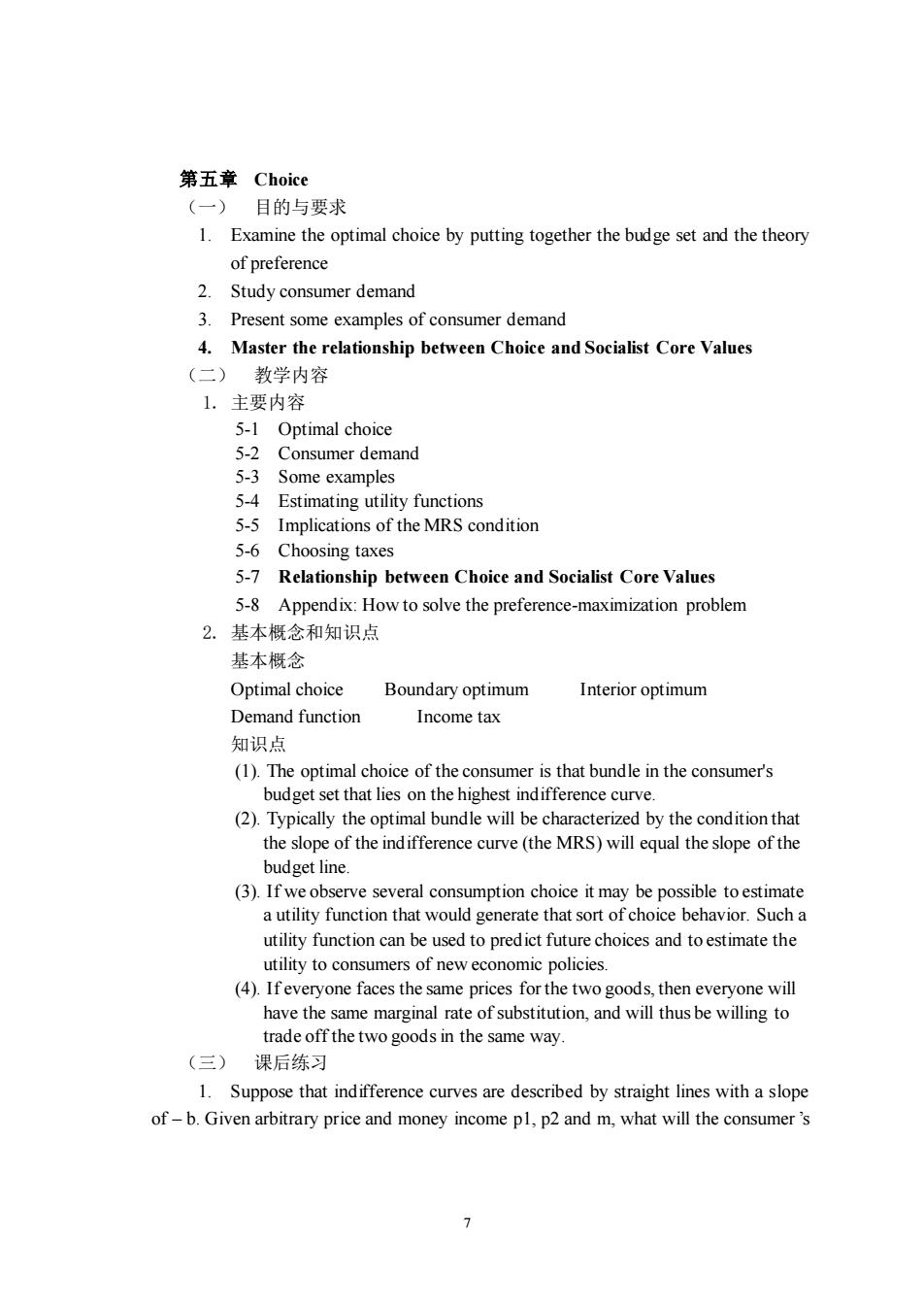
第五章Choice (一) 目的与要求 1.Examine the optimal choice by putting together the budge set and the theory of preference 2. Study consumer demand 3.Present some examples of consumer demand 4.Master the relationship between Choice and Socialist Core Values (二)教学内容 1.主要内容 5-1 Optimal choice 5-2 Consumer demand 5-3 Some examples 5-4 Estimating utility functions 5-5 Implications of the MRS condition 5-6 Choosing taxes 5-7 Relationship between Choice and Socialist Core Values Appendix:How to solve the preference-maximization problem 2.基本概念和知识点 基本概念 Optimal choice Boundary optimum Interior optimum Demand functior Income tax 知识占 (1).The optimal choice of the consum r is that bundle in the consumer's dget set that lies on the highest ir ndifference curve (2).Typically the optimal bundle will be characterized by the condition tha the slope of the indifference curve(the MRS)will equal the slope of the budget line. umption choice it may be possible toestimate at would generatet nat sort o choice behavio uch a utility function can be used to pred ict future choices and to estimate the utility to consumers of new economic policies. (4).Ifeveryone faces the same prices for the two goods,then everyone will have the same marginal rate of substitution,and will thus be willing to trade off the two goods in the same way (三) 课后练习 1.Suppose that indifference curves are described by straight lines with a slope of-b.Given arbitrary price and money income pl,p2 and m,what will the consumer's 7
7 第五章 Choice (一) 目的与要求 1. Examine the optimal choice by putting together the budge set and the theory of preference 2. Study consumer demand 3. Present some examples of consumer demand 4. Master the relationship between Choice and Socialist Core Values (二) 教学内容 1. 主要内容 5-1 Optimal choice 5-2 Consumer demand 5-3 Some examples 5-4 Estimating utility functions 5-5 Implications of the MRS condition 5-6 Choosing taxes 5-7 Relationship between Choice and Socialist Core Values 5-8 Appendix: How to solve the preference-maximization problem 2. 基本概念和知识点 基本概念 Optimal choice Boundary optimum Interior optimum Demand function Income tax 知识点 (1). The optimal choice of the consumer is that bundle in the consumer's budget set that lies on the highest indifference curve. (2). Typically the optimal bundle will be characterized by the condition that the slope of the indifference curve (the MRS) will equal the slope of the budget line. (3). If we observe several consumption choice it may be possible to estimate a utility function that would generate that sort of choice behavior. Such a utility function can be used to predict future choices and to estimate the utility to consumers of new economic policies. (4). If everyone faces the same prices for the two goods, then everyone will have the same marginal rate of substitution, and will thus be willing to trade off the two goods in the same way. (三) 课后练习 1. Suppose that indifference curves are described by straight lines with a slope of – b. Given arbitrary price and money income p1, p2 and m, what will the consumer’s

optimal choices look like? (四)教学方法与手段 课堂讲授与讨论。 第六章Demand (一) 目的与要求 1.Examine how the demand for a good changes as prices and income change 2.Examine normal and inferior goods 3.Examine ordinary and Giffen goods 4.Examine how to promote the healthy development of China's Cultural Industry (二)教学内容 1.主要内容 6-1 Normal and inferior goods 6-2 Income offer curves and Engel curves 6-3 Some examples 6.5 6-6 Some example 6-7 The inverse demand function 6-8 The Theory of Demand Level and the Healthy Development of China's Cultural Industry 2.基本概念和知识点 基本概念 Normal good Inferior good Engel curve Luxury good Necessary good Homothetic preferences Demand curve Reservation price Substitute Complement Inverse demand function Inverse demand curve 知识点 (1) The consumer's demand function for a good will in general depend on the prices of all goods and income (2).A normal good is one for which the demand increases when income increases.An inferior good is one for which the demand decreases when income increases (3). An ordinary good is one for which the demand decreases when its price increases.A Giffen good is one for which the demand increases when its price increases. (4).Ifthe demand for good 1 increases when the price of good 2 increases 8
8 optimal choices look like? (四) 教学方法与手段 课堂讲授与讨论。 第六章 Demand (一) 目的与要求 1. Examine how the demand for a good changes as prices and income change 2. Examine normal and inferior goods 3. Examine ordinary and Giffen goods 4. Examine how to promote the healthy development of China's Cultural Industry (二) 教学内容 1. 主要内容 6-1 Normal and inferior goods 6-2 Income offer curves and Engel curves 6-3 Some examples 6-4 Ordinary goods and Giffen goods 6-5 The price offer curve and the demand curve 6-6 Some examples 6-7 The inverse demand function 6-8 The Theory of Demand Level and the Healthy Development of China's Cultural Industry 2. 基本概念和知识点 基本概念 Normal good Inferior good Engel curve Luxury good Necessary good Homothetic preferences Demand curve Reservation price Substitute Complement Inverse demand function Inverse demand curve 知识点 (1). The consumer's demand function for a good will in general depend on the prices of all goods and income. (2). A normal good is one for which the demand increases when income increases. An inferior good is one for which the demand decreases when income increases. (3). An ordinary good is one for which the demand decreases when its price increases. A Giffen good is one for which the demand increases when its price increases. (4). If the demand for good 1 increases when the price of good 2 increases
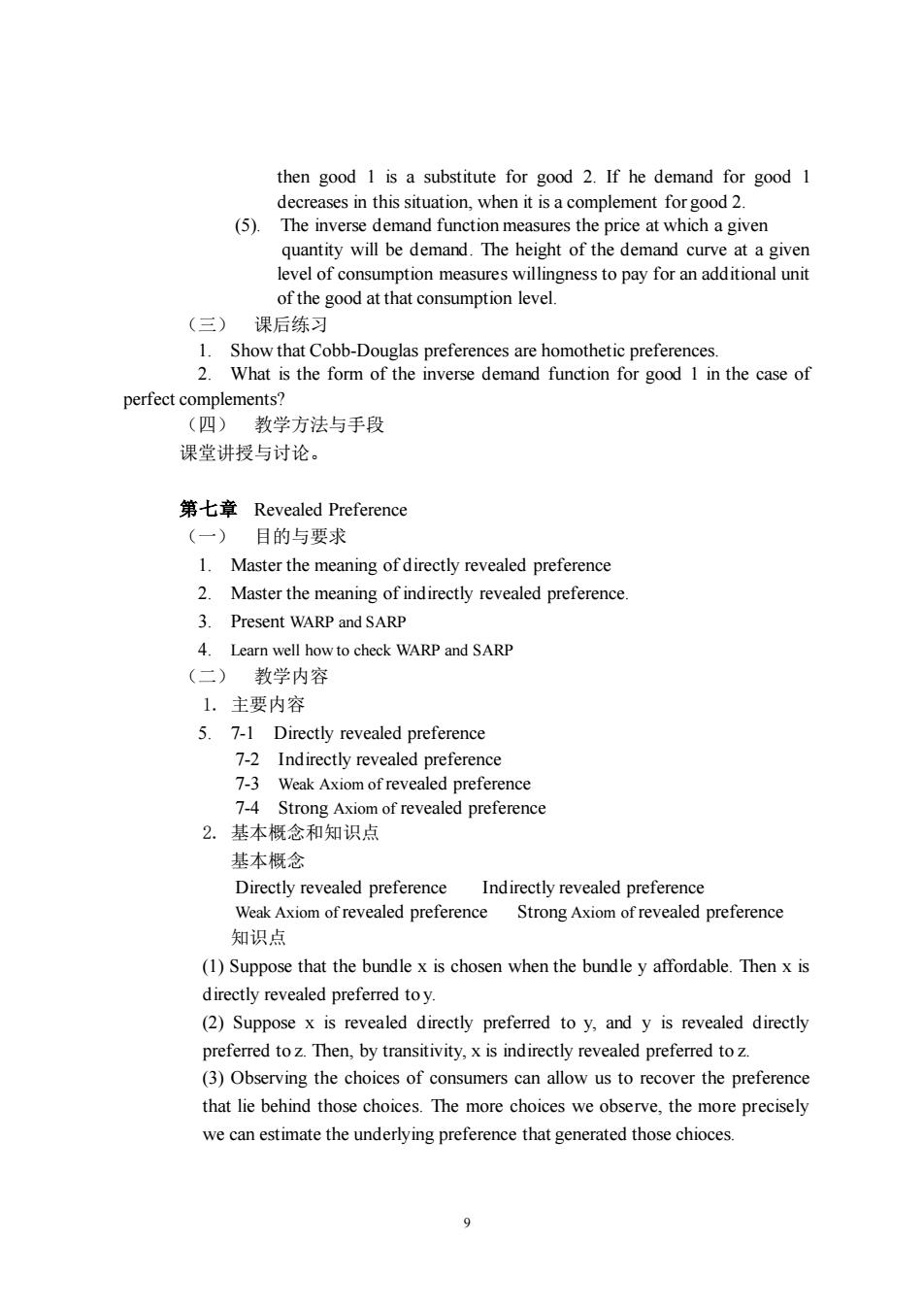
then good 1 is a substitute for good 2.If he demand for good 1 decreases in this situation when it is a complement for good 2. (5).The inverse demand function measures the price at which a given qua nt y will be demard.The height of the dem and curv at a giver level of consumption measures willingness to pay for an additional uni of the good at that consumption level. (三)课后练习 1. w that Cobb-Douglas preferences are homothetic preferences 2. What is the form of the inverse demand function for good I in the case of perfect complements? (四)教学方法与手段 课堂讲授与讨论。 第七章Revealed Preference (一)目的与要求 1.Master the meaning of directly revealed preference 2.Master the meaning of indirectly revealed preference 3 Present WaRP and SARp 4.Learn well how to check WARP and SARP (二)教学内容 1.主要内容 5.7-1 Directly revealed preference 7-Indireetly revealed preference Weak Axiom of revealed preference 7-4 Strong Axiom of revealed preference 2.基本概念和知识点 基本概念 Directly revealed preference Indirectly revealed preference Weak axiom of revealed preference Strong axiom of revealed preference 知识点 (1)Suppose that the bundle x is chosen when the bundle y affordable.Then x is directly revealed preferred toy (2)Suppose x is revealed directly preferred to y,and y is revealed directly preferred toz.Then,by transitivity,x is indirectly revealed preferred toz. (3)Observing the choices of consumers can allow us to recover the preference that lie behind those choices.The more choices we observe,the more precisely we can estimate the underlying preference that generated those chioces
9 then good 1 is a substitute for good 2. If he demand for good 1 decreases in this situation, when it is a complement for good 2. (5). The inverse demand function measures the price at which a given quantity will be demand. The height of the demand curve at a given level of consumption measures willingness to pay for an additional unit of the good at that consumption level. (三) 课后练习 1. Show that Cobb-Douglas preferences are homothetic preferences. 2. What is the form of the inverse demand function for good 1 in the case of perfect complements? (四) 教学方法与手段 课堂讲授与讨论。 第七章 Revealed Preference (一) 目的与要求 1. Master the meaning of directly revealed preference 2. Master the meaning of indirectly revealed preference. 3. Present WARP and SARP 4. Learn well how to check WARP and SARP (二) 教学内容 1. 主要内容 5. 7-1 Directly revealed preference 7-2 Indirectly revealed preference 7-3 Weak Axiom of revealed preference 7-4 Strong Axiom of revealed preference 2. 基本概念和知识点 基本概念 Directly revealed preference Indirectly revealed preference Weak Axiom of revealed preference Strong Axiom of revealed preference 知识点 (1) Suppose that the bundle x is chosen when the bundle y affordable. Then x is directly revealed preferred to y. (2) Suppose x is revealed directly preferred to y, and y is revealed directly preferred to z. Then, by transitivity, x is indirectly revealed preferred to z. (3) Observing the choices of consumers can allow us to recover the preference that lie behind those choices. The more choices we observe, the more precisely we can estimate the underlying preference that generated those chioces

(4)The WARP and SARP are necessary conditions that consumer choices have to obey if they are to be consistent with the economic model of optimizing chioce (三)课后练习 1.Check SARPand WARP according to table 7.2 and 7.3 (四)教学方法与手段 课堂讲授与讨论。 第八章Slutsky Equation (一)目的与要求 6.Examine the substitution effect,the income effect and the total effect as the price of a good changes 7.Present the Law of Demand 8.Examine some examples of income and substitution effects 9.Examine Another(Hicks)substitution effects (二) 教学内容 1.主要内容 8-1 The Substitution Effect The Income Effect 83 The Total Chang In Demand 8-4 Rates of change 8-5 The law of demand 8-7 tioneffect Compensated demand cures 2.基本概念和知识点 基本概念 Giffen good Substitution effect Income effect The Law of Demand Compensated demand curve 知识点 (1).When the price of a good decreases,there will be two effects on consumption.The change in relative prices make the consumer want to consume more of the cheaper good.The increase in purchasing power due to the lower price increaseor decrease consumption,depending on whether the goods is a normal good or an inferior good (2).The change in demand due tothe change in relative prices is called the substitution effect,the change due to the change in purchasing power is called the income effect. 10
10 (4) The WARP and SARP are necessary conditions that consumer choices have to obey if they are to be consistent with the economic model of optimizing chioce. (三) 课后练习 1. Check SARP and WARP according to table 7.2 and 7.3 (四) 教学方法与手段 课堂讲授与讨论。 第八章 Slutsky Equation (一) 目的与要求 6. Examine the substitution effect, the income effect and the total effect as the price of a good changes 7. Present the Law of Demand 8. Examine some examples of income and substitution effects 9. Examine Another (Hicks) substitution effects (二) 教学内容 1. 主要内容 8-1 The Substitution Effect 8-2 The Income Effect 8-3 The Total Chang In Demand 8-4 Rates of change 8-5 The law of demand 8-6 Examples of income and substitution effect 8-7 Another substitution effect 8-8 Compensated demand cures 2. 基本概念和知识点 基本概念 Giffen good Substitution effect Income effect The Law of Demand Compensated demand curve 知识点 (1). When the price of a good decreases, there will be two effects on consumption. The change in relative prices make the consumer want to consume more of the cheaper good .The increase in purchasing power due to the lower price increase or decrease consumption, depending on whether the goods is a normal good or an inferior good. (2). The change in demand due to the change in relative prices is called the substitution effect; the change due to the change in purchasing power is called the income effect